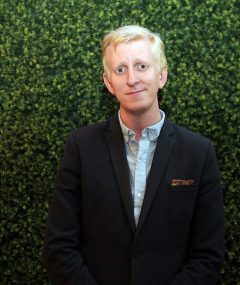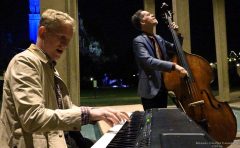Featured Stories
Gigging for a Living: Ed Kornhauser
There are two tall drinks in front of Ed Kornhauser. One looks like a coffee drink and the other is a smoothie. He sips from one then the other. “I’m a working musician,” he says. “That’s how I make my living.”
If you’ve spent any amount of time around San Diego, you’d have a hard time refuting what Kornhauser has just said. On almost any given night he can be found at one of our local restaurants, nightspots, or music showcases. And in the past seven or eight years he has established himself as one of San Diego’s top pianist/ keyboardists. He regularly performs and records with the Matt Smith Neu Jazz Trio and the band Juice Box. He is an accompanist for top-notch singers such as Whitney Shay and Leonard Patton.
Kornhauser and the tall drinks are at a trendy café with outside seating. Tikis hang ironically on the walls, and it looks like he and I are the only ones not silently pecking at a laptop or texting on a phone. The Santa Anas have kicked in, the winds are dropping leaves around us and making the large shade umbrellas quake. Kornhauser wears blue jeans and a colorful print shirt. Despite the heat of the Santa Ana, he is wearing a dark jacket.
As the heat pressed down and the wind picked up, Kornhauser told me he was prepping for a session in Pasadena to record with the Matt Smith Neu Jazz Trio. Saxophonist Dayna Stephens and trumpeter Curtis Taylor are joining the trio for the recording, and Kornhauser was in the process of arranging a tune that included the horns. He explained to me the relationship between the key of the tune–in this case, he was working on a composition in Db–and the range of the instruments; the instrument he was concentrating on was the trumpet. The key affected what range the trumpet would play the tune in, and he was concerned that the range not be too high or low.
Though he does compose and arrange, his life and his living is one of going from gig to gig, performing solo or in differing musical ensembles, and recording from time to time. I think of him as a jazz pianist, but he performs all sorts of music. “I do the pop thing. I do just about anything. And I like it all,” he says. Jazz snobs may not appreciate this, but Kornhauser likes country music and likes doing his country gigs, too. “I really like Floyd Cramer,” he adds.
When Kornhauser was 19 he secured a position with a church, the small congregation Unity Way in Vista, as their pianist/accompanist. And he has kept that job for the last ten years, a gig of rare longevity for most working musicians aside from orchestral players. “It’s given me a lot of stability. Having that steady work has allowed me the chance to do creative projects,” he says.
A bit on the tall side, Kornhauser has blond hair that he wears short and parts on the left. His eyes are China blue. He jokes a lot, and his expressions can range from intense concentration to mock ironic seriousness.
One thing that is obvious, Ed Kornhauser is smart. And it is probably in his genes. His father, having earned two Ph.D. degrees–one in physics, the other in engineering, and both from Harvard–was a professor of engineering at Brown University. His mother is the writer Jincy Willett, who has published both short stories and novels. Willet teaches writing, including instruction at Brown University Extension and UCSD Extension. She also conducts writing workshops.
If you’ve ever spent any time with Ed Kornhauser, you know that he has a great sense of humor. Much of this must have come from his mother. Her writing is praised for its sharp satire and dark humor. Fittingly, among her admirers is humorist and author David Sedaris. And of course her son is a great admirer of her as well. “She is absolutely great! I’ve always loved her stuff. It’s super dark comedy,” Kornhauser says.
When he was in third grade, after a time when he wanted to be an airline pilot, Kornhauser considered following in his mother’s footsteps and becoming a writer, too. While he was in grade school, he produced a number of short stories and even a novel. He confesses that he still loves to write. “I just love the sheer act of writing,” he says. “I enjoy the act of putting words together. I just love to use words to make sense of things.”
So we see where Ed Kornhauser gets his smarts and sense of humor. What about the music? His grandmother was a music arranger who arranged for choir and barbershop quartet. “And my mom plays piano. She is an excellent sight-reader, too,” he adds. His older brothers are also musicians, both of them taking to bluegrass music. Brother John plays bluegrass in San Francisco and the Bay Area. Brother Al plays electric mandolin. Interestingly enough, Al lives in Japan and works for an American beer company in China.
Kornhauser’s personal relationship with music started in middle school, when he joined the school band. He picked up the tuba. “I thought that I’d always have access to it, because no one else wanted to play it’” he says. “It also meant that I didn’t have to buy one. I could just play the one that the school had. I played it for eight years.”
The turning point for the young musician was the night that the bass player was out sick and couldn’t make the band rehearsal. “I wound up reading off of the bass player’s music that night, and in addition to the notes, there were the chords of the tune. And I remember thinking ‘What are these?’” Seeing that music had a structure gave the young Kornhauser one of those light bulb moments. “After I saw that, I threw myself into it.” He continued to play tuba but started more and more to play piano, his main instrument today.
Diving into music took him out of Escondido to the Coronado School of the Arts, the very competitive public arts conservatory for music, dance, and the visual arts. This meant that he had to get up at 5 a.m. each morning to commute more than 60 miles (over 120 miles round trip) for his education.
To this day, Kornhauser is more comfortable with the chord changes rather than the notes that comprises a composition. And though he is competent at reading music, he admits that reading through lots of notes on a page without the changes is not his forte. “You put Chopin in front of me, I’m screwed,” he says with a bit of self-deprecating humor.
Kornhauser majored in jazz studies at San Diego State and credits Rick Helzer for what Kornhauser calls “opening up my ears.” Though he came from a highly educated family, he feels no pressure to get an advanced degree. “I could see pursuing my master’s if I was going to teach or do more writing, but I don’t see any need for that right now,” he says.
Kornhauser plays in Juice Box, a band so committed to the sound of soul and funk of 40 and 50 years ago that they make sure to use an actual vintage Fender Rhoades in their mix. They even release their recordings on vinyl. (Don’t worry if you’re not a Luddite record collector. They also release their recordings on compact disk.) And though the band has its roots in funk and soul, don’t think that it is tribute band. The tunes are new, and there is something of a fresh take on these classic sounds, with a lot of space and openness in arrangements. Kornhauser is also embarking on an organ trio project.
As a working musician, Kornhauser emphasizes the importance of fitting into the gig. If it’s a trad jazz gig, you play trad jazz. If it’s a country gig, you play country. Though he is well-versed in all things jazz and can play those be bop tunes with the best of them, there is no reason to play over the heads of your audience or play anything that does not fit in with what the other players are doing.
Gigs that require a lot of work he gladly takes on. He has a few four-hour jobs coming up. A lot of musicians think of these long gigs as too grueling. “But you can do them. You just have to pace yourself and stretch out your ideas. And if I’m playing in a corner of a restaurant and nobody’s really paying attention to me, it doesn’t mean that I can’t still be creative,” he says. “And it sure beats a lot of other things I could do to make a living.”
Ed Kornhauser is playing quite a few gigs in December. Check the monthly calendar for details.












